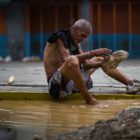COVID-19
How COVID-19 has Reshaped Education in Guyana’s Hinterland
|
It’s Monday morning at the indigenous village of Aishalton, in Guyana’s Deep South Rupununi region. 39-year-old Immaculata Casimero proudly dons a shawl that identifies her Wapichan heritage.
She’s in a rush, but makes sure to pull her mask across her face ahead of the 15 minute trek across the savannah to her daughter Kiarra’s primary school. COVID-19 has changed just about everything in her village, including her daughter’s education. Pandemic lockdowns forced an end to normal classes. Students now work from home with parents filling the roles of teachers as best they can. Immaculata describes how, on selected days of each week, she visits her daughter’s class teacher for guidance on four core subjects: English, Mathematics, Social Studies and Science. “Parents have to work with their children at home and try to see how best they can educate their children,” she noted.
She said the situation requires the parent to refresh their own knowledge of the subjects. First, the teacher guides and instructs the parent through the entire lesson.












